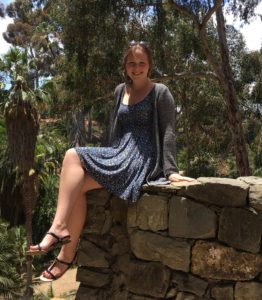Jennifer Rutishauser, a pre-med double major in biology and history, will be graduating in the spring as the Valedictorian of the Class of 2017 and is planning on working in the realm of pediatric oncology. I had the opportunity to talk with her about her favorite moments in the Honors program, the research she has done for her senior thesis, and her plans for after graduation.

Q:What are some of your favorite things about Honors? Do you have a favorite memory?
Jenn: I really like the social community you get with Honors; obviously, freshmen and sophomore year you’re in the same class with all the familiar faces but it also establishes who your best friends are. For me, all of my best friends that I have now are people that are in Honors even though we don’t have classes together now. It established my group for college. I also just really like how Honors set me up to do better later in college; it gave me a really good foundation in terms of it being strenuous but giving me good writing and foundational skills.
My year of Honors we played a game of Assassin sophomore year. At our interdisciplinary seminar it was down to three of us and we had this rule where if you were holding a spoon you were safe; so I was holding my spoon and one of my friends, Dom, who was also still in, was holding his spoon and Dr. Keller, who didn’t know me because I hadn’t been in her class, came up and we were explaining it to her. She was like, “Oh so if I take Jenn’s spoon you win, Dom?” and he told her yes so all of a sudden she came up behind me and started attacking me to get the spoon. This was basically my first interaction with Dr. Keller so that was pretty great. It’s so hard to pick one favorite memory because I feel like there’s so many but that’s one that sticks out.
Q: What is your Senior Thesis about?
Jenn: I’m examining the role of a particular protein in the process of cell differentiation. So differentiation is a process through which a cell becomes committed to a certain phase, and so I’m looking at skin cells. The cells that we see as skin are terminally differentiated and I’m looking at the effect that this protein called PYK-2 has on differentiation. The main way that I’m doing that is that I’m looking at a cell line that has this protein and then at another where this protein has been removed and then you differentiate the cell lines in tandem and see what the differences are between the two.
Q: What are your post-grad plans?
Jenn: I’m applying to medical school this June so I’m not going straight in but I definitely still feel very strongly and passionately about going into medicine. I just recently got accepted into a gap-year program at Kuchnir Dermatology & Dermatologic Surgeon (KDDS), which is a private practice outside of Boston that has developed a program specially intended for students on their gap year between college and medical school. I’ll be acting as a medical assistant, basically doing anything that you can do without a medical degree, so assisting the doctors and gaining clinical experience. I’m really excited about that; I’ll be there from June through July 2018 so the idea is that’s what I’ll do while I’m applying and going into medical school.